BMW X1 vs Ford Kuga - Differences and prices compared
Compare performance (326 HP vs 243 HP), boot space and price (38200 £ vs 34200 £ ) at a glance. Find out which car is the better choice for you – BMW X1 or Ford Kuga?
Costs and Efficiency:
When it comes to price and running costs, the biggest differences usually appear. This is often where you see which car fits your budget better in the long run.
Ford Kuga has a a bit advantage in terms of price – it starts at 34200 £ , while the BMW X1 costs 38200 £ . That’s a price difference of around 3986 £.
Fuel consumption also shows a difference: BMW X1 manages with 2.50 L and is therefore slightly more efficient than the Ford Kuga with 2.80 L. The difference is about 0.30 L per 100 km.
As for electric range, the BMW X1 performs a bit better – achieving up to 81 km, about 13 km more than the Ford Kuga.
Engine and Performance:
Power, torque and acceleration are the classic benchmarks for car enthusiasts – and here, some clear differences start to show.
When it comes to engine power, the BMW X1 has a distinct edge – offering 326 HP compared to 243 HP. That’s roughly 83 HP more horsepower.
In acceleration from 0 to 100 km/h, the BMW X1 is distinct quicker – completing the sprint in 5.40 s, while the Ford Kuga takes 7.30 s. That’s about 1.90 s faster.
In terms of top speed, the BMW X1 performs to a small extent better – reaching 233 km/h, while the Ford Kuga tops out at 200 km/h. The difference is around 33 km/h.
There’s also a difference in torque: BMW X1 pulls decisively stronger with 477 Nm compared to 240 Nm. That’s about 237 Nm difference.
Space and Everyday Use:
Whether family car or daily driver – which one offers more room, flexibility and comfort?
Both vehicles offer seating for 5 people.
In curb weight, Ford Kuga is hardly perceptible lighter – 1526 kg compared to 1575 kg. The difference is around 49 kg.
In terms of boot space, the BMW X1 offers distinct more room – 540 L compared to 412 L. That’s a difference of about 128 L.
In maximum load capacity, the BMW X1 performs slight better – up to 1545 L, which is about 11 L more than the Ford Kuga.
When it comes to payload, Ford Kuga slight takes the win – 550 kg compared to 500 kg. That’s a difference of about 50 kg.
Who wins the race in the data check?
The BMW X1 is decisively ahead in the objective data comparison.
This result only shows which model scores more points on paper – not which of the two cars feels right for you.
Costs and Consumption
View detailed analysis
Engine and Performance
View detailed analysis
Dimensions and Body
View detailed analysis
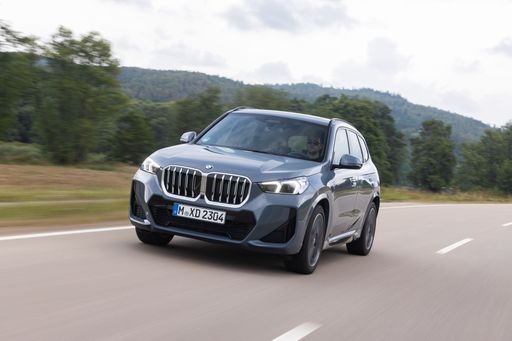
BMW X1
BMW X1
The BMW X1 brings a premium feel to compact crossover life, wrapping practical space and agile handling into a tidy, upscale package. It’s ideal for buyers who want BMW driving dynamics without the bulk, offering everyday comfort and a few clever tricks to keep the commute interesting.
details
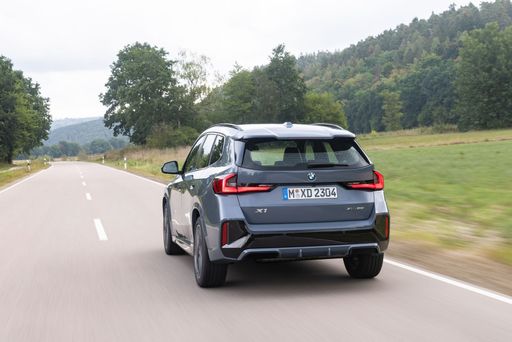
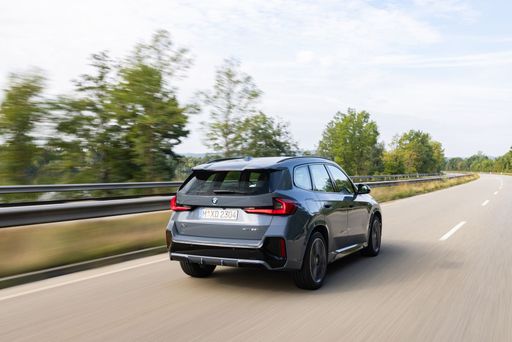
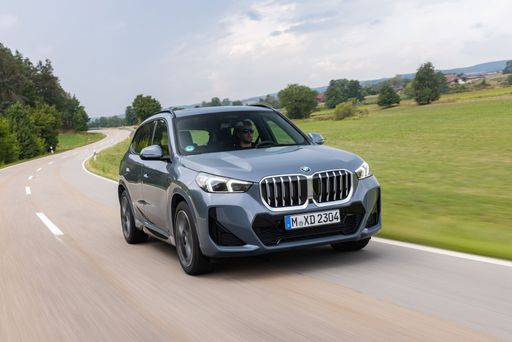
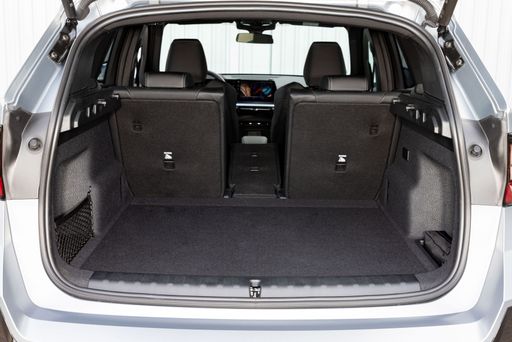
Ford Kuga
The Kuga is Ford’s adaptable family SUV that blends usable space with a surprisingly lively driving character, making daily commutes and weekend escapes equally enjoyable. With smart interior packaging, an easy-to-use infotainment setup and composed road manners, it’s a sensible choice for buyers who want a bit of fun without the fuss.
details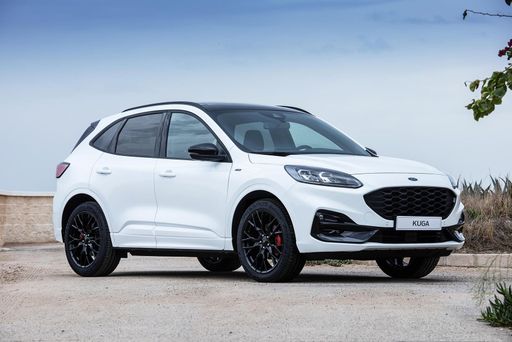
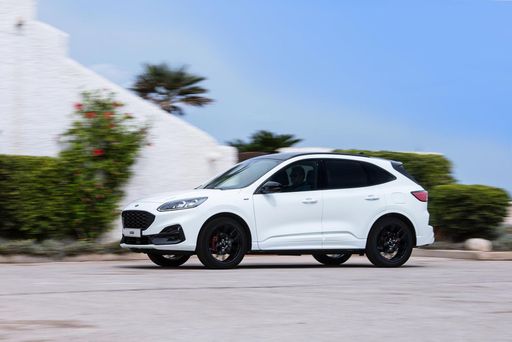

Costs and Consumption |
|
|---|---|
|
Price
38200 - 55500 £
|
Price
34200 - 46300 £
|
|
Consumption L/100km
2.5 - 7.7 L
|
Consumption L/100km
2.8 - 6.8 L
|
|
Consumption kWh/100km
-
|
Consumption kWh/100km
-
|
|
Electric Range
81 km
|
Electric Range
68 km
|
|
Battery Capacity
14.20 kWh
|
Battery Capacity
1.1 - 14.4 kWh
|
|
co2
57 - 175 g/km
|
co2
55 - 154 g/km
|
|
Fuel tank capacity
47 - 54 L
|
Fuel tank capacity
42 - 54 L
|
Dimensions and Body |
|
|---|---|
|
Body Type
SUV
|
Body Type
SUV
|
|
Seats
5
|
Seats
5
|
|
Doors
5
|
Doors
5
|
|
Curb weight
1575 - 1935 kg
|
Curb weight
1526 - 1859 kg
|
|
Trunk capacity
490 - 540 L
|
Trunk capacity
412 L
|
|
Length
4500 mm
|
Length
4604 - 4645 mm
|
|
Width
1845 mm
|
Width
1882 mm
|
|
Height
1630 - 1642 mm
|
Height
1673 - 1681 mm
|
|
Max trunk capacity
1495 - 1545 L
|
Max trunk capacity
1534 L
|
|
Payload
490 - 500 kg
|
Payload
541 - 550 kg
|
Engine and Performance |
|
|---|---|
|
Engine Type
Diesel MHEV, Petrol MHEV, Petrol, Diesel, Plugin Hybrid
|
Engine Type
Petrol, Full Hybrid, Plugin Hybrid
|
|
Transmission
Automatic
|
Transmission
Manuel, Automatic
|
|
Transmission Detail
Dual-Clutch Automatic
|
Transmission Detail
Manual Gearbox, CVT, Automatic Gearbox
|
|
Drive Type
Front-Wheel Drive, All-Wheel Drive
|
Drive Type
Front-Wheel Drive, All-Wheel Drive
|
|
Power HP
136 - 326 HP
|
Power HP
150 - 243 HP
|
|
Acceleration 0-100km/h
5.4 - 9.2 s
|
Acceleration 0-100km/h
7.3 - 9.9 s
|
|
Max Speed
190 - 233 km/h
|
Max Speed
195 - 200 km/h
|
|
Torque
230 - 477 Nm
|
Torque
240 Nm
|
|
Number of Cylinders
3 - 4
|
Number of Cylinders
3 - 4
|
|
Power kW
100 - 240 kW
|
Power kW
111 - 178 kW
|
|
Engine capacity
1499 - 1998 cm3
|
Engine capacity
1496 - 2488 cm3
|
General |
|
|---|---|
|
Model Year
2024 - 2025
|
Model Year
2025
|
|
CO2 Efficiency Class
D, E, F, B
|
CO2 Efficiency Class
E, D, B
|
|
Brand
BMW
|
Brand
Ford
|
Is the BMW X1 offered with different drivetrains?
The BMW X1 is offered with Front-Wheel Drive or All-Wheel Drive.




